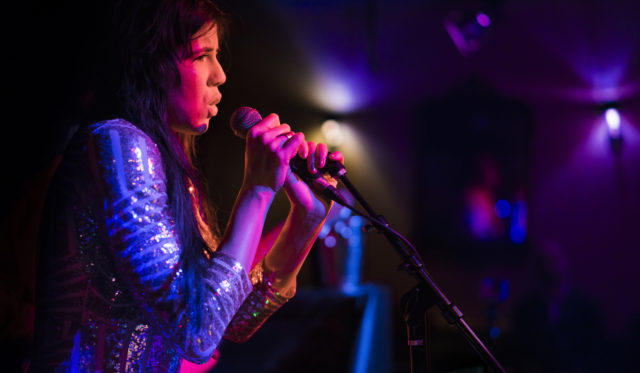
When I graduated high school and walked out of that gymnasium with its sticky bleacher seats and gross glossed-wood floor for the final time I never thought that I would go willingly sit in a cramped room filled with sweaty, screaming people again. Spectator sports? Not my scene. Pep rallies? No thank you. But that was before I slipped into the converted basement of a downtown church with that same sticky hardwood floor — the polish was so thick it felt like I was sinking. I had come to support a former college friend who I heard had started a poetry slam series. I had no idea how powerful queer slam poetry is. I felt like I had to come. I wasn’t excited.
But I soon felt invigorated. My mind changed almost immediately. I was spellbound by all kinds of queer people talking loudly, proudly, and rhyming. I understood why queer people gather here, why queer people love slam poetry so much:
It’s so confessional.
For lesbians, trans women, and queer people it is difficult to exist for long without being polite. But in slam poetry, that boundary isn’t there. It’s an opportunity to express every little thing that builds toward the big narratives of queer life. An ice cube in a warm room becomes the tip of the iceberg in a metaphor for queer existence. And you can talk about anything. I’m thinking of writing one about the time the Jimmy John’s cashier asked how I was and I told her, “I feel okay about my body today and I’d like a turkey and cucumber sandwich.”
It’s performative.
Not only can you talk about yourself in a way that is way too intimate for everyday interactions with cashiers or on the street, but you can talk about it as loudly as you want. You can wave your hands around in ways that make people on the subway think you’re going to hurt someone.
People always say that gender is a performance and slam poetry proves it. You can play up your gender, your accent, your appearance. Everything you can carry on your body or in your mouth is available as your prop. You can talk so quietly that the microphone — if there is one — barely picks you up and the audience leans in. You can play around so purely it’s like going to a party where everyone has to pay attention to you for once, and nobody is going to care if you were the worst actor in your community theater acting troop because it’s not about acting — it’s about being believed.
It’s accessible.
You don’t need to be a Shakespearean scholar or an autodidactic auteur to enjoy slam poetry. I don’t mean to say that it isn’t smart — it is — but poetry slams often lack the kind of barriers that more traditional poetry puts up. There’s not academic exclusion or income barriers. Slam poetry draws in those that the rest of the art world predominately rejects. Nobody — at least, I hope nobody — is standing with her chin in her palm looking over a slam poem like a Jackson Pollock, saying, “Ah, here’s what it clearly means,” Chardonnay in hand. Okay, maybe I have been to a slam with a Chardonnay in hand, but that is a different story.
Another thing that makes poetry slams so accessible is that they are everywhere. They are held in people’s homes and apartments, in the basements of churches (don’t worry, there was an elevator), in fancy coffee shops, in low-brow dive bars.
It’s a good place to meet people.
That night, in the public space beneath a United Methodist Church, I was surprised just how many people I saw, how many of those familiar friends brought friends and how the circle of acquaintances kept spreading. A few weeks later, as these things work, I was invited to another show. Another girl I knew was performing in a swanky little jazz bar. So I brought some people, we bought some drinks, and we milled about for a while before the emcee took the stage. Everyone around kind of mingled and was introduced to other people. Groups formed and fluctuated like coagulating liquids, and some cute couples formed further from those.
True life: I can’t watch slam poetry with my girlfriend because it always gets one of us too riled up and we both like it.
It’s queer and different.
At my first real poetry slam, I was worried I would anticipate the rhythms, recognize the clichés, and feel just so out of place. But, jeez, I am proud to say I was wrong about all of those things. It was less rah-rah and more just… raw. It was less like church at its boring and biased worst and more like church at its wholesome, community-building best.
At the end of the day, queer people love slam poetry so much because it’s just like us — it’s different, it’s outside of the bounds prescribed by straight spaces, and it calls all homogeneous spaces into question, disputes values, and reaches out for difficult, intimate, broad, and political conversations about gender, sexuality, race, and identity. It is a form and a method meant to challenge these things. It’s a space where we can authentically speak ourselves, perform ourselves, access each other, and meet each other. It’s a space for genuine expressions of queer, lesbian, bisexual, and transgender being.

What Do You Think?